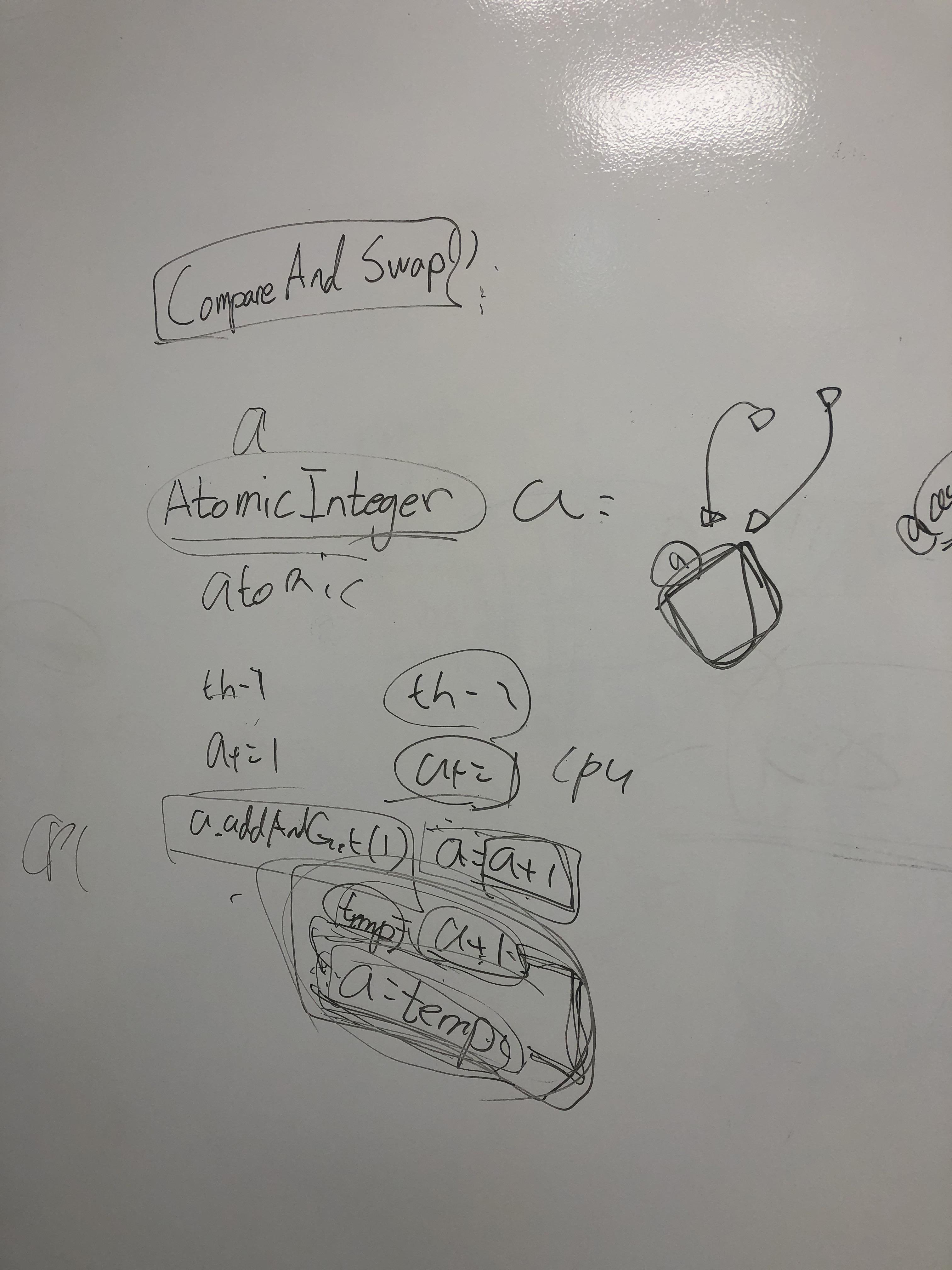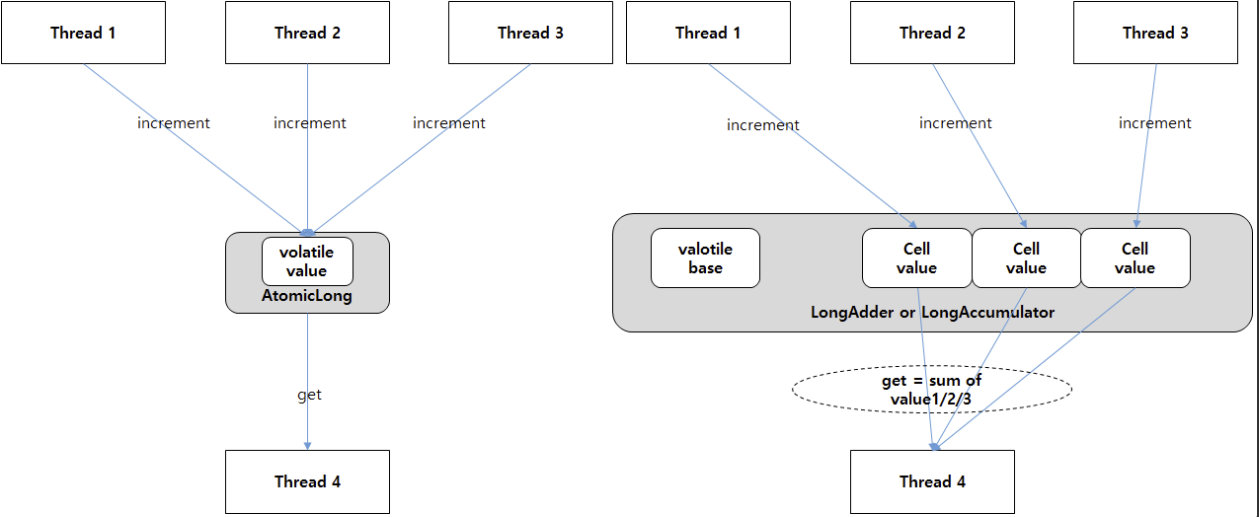자바에서 Thread-Safe 즉, 데이터에 대해 동시 접근을 제어하기 위해 Lock(
2020/11/24 - [Language/Java] - Java thread에서의 Lock의 종류?) 을 사용한다.
그런데 이 데이터가 그냥 값을 읽거나 업데이트 정도의 기능일 경우에는
Lock보다는 원자성(Atomic) 변수가 더 성능도 좋고 효율적이다.
아래는 Thread-Safe 이야기 하다가 나옴 ㅋㅋ

오늘 포스팅은 AtomicInteger와 LongAdder에 대해 알아보고자 한다.
LongAdder의 경우 실제 서비스에서 사용하고 있다.
위의 사진에서 보면 여러가지 정보가 있는데 하나씩 살펴보면..!
int a = 0;
thread-1 thread-2
a+=1 a+=1
의 경우 CPU에 의해 처리가 되는데 3단계로 처리가 된다.
1) Load : a 변수의 값을 메모리에서 CPU 레지스터리로 Load.
2) Add : 레지스터의 값을 1 증가.
3) Store: 레지스터의 값을 메모리에 저장.
위에서 Load, Add, Store는 각각은 원자적으로 수행되지만 3개의 연산 전체가 원자적으로 수행되지는 않는다.
그러므로 각각의 연산 중간에 다른 Thread가 메모리 값을 덮어 쓸 수 있는 상황이 발생할 수 있다.
해결방안으로 AtomicInteger를 사용하면 되는데 코드는 아래와 같다.
public final int incrementAndGet() {
return U.getAndAddInt(this, VALUE, 1) + 1;
}
/**
* Atomically adds the given value to the current value of a field
* or array element within the given object {@code o}
* at the given {@code offset}.
*
* @param o object/array to update the field/element in
* @param offset field/element offset
* @param delta the value to add
* @return the previous value
* @since 1.8
*/
@HotSpotIntrinsicCandidate
public final int getAndAddInt(Object o, long offset, int delta) {
int v;
do {
v = getIntVolatile(o, offset);
} while (!weakCompareAndSetInt(o, offset, v, v + delta));
return v;
}
@HotSpotIntrinsicCandidate
public final boolean weakCompareAndSetInt(Object o, long offset,
int expected,
int x) {
return compareAndSetInt(o, offset, expected, x);
}
/**
* Atomically updates Java variable to {@code x} if it is currently
* holding {@code expected}.
*
* <p>This operation has memory semantics of a {@code volatile} read
* and write. Corresponds to C11 atomic_compare_exchange_strong.
*
* @return {@code true} if successful
*/
@HotSpotIntrinsicCandidate
public final native boolean compareAndSetInt(Object o, long offset,
int expected,
int x);
CAS(CompareAndSetxxx)연산을 사용한다.
compareAndSet(int expect, int update)
Atomically sets the value to the given updated value if the current value == the expected value.
LongAdder는 AtomicLong에서 사용하는 CAS 연산에 의한 경합 과정에서 Cpu 소모를 줄이기 위해 고안
1) 서로 다른 변수를 접근하여 쓰레드 간의 경쟁(Race Condition)을 최소화 한다.
2) Cache의 False Sharing을 방지하여 내부적인 성능 하락 요소를 최소화 한다.

AtomicLong의 경우 CAS를 사용하여 경합이 빈번한 상황에서 반복적인 메모리 읽기와 비교연산을 수행하게 되는데 이는 Cpu를 소모하게 된다. 위처럼 단일 Volatile 변수를 서로 공유하기 때문에 이와 같은 경합 과정이 발생한다.
하지만 LongAdder의 경우 이를 해결하기 위해 쓰레드 별로 별도의 데이터를 배열로 관리하고 각 쓰레드가 경합이 발생하는 상황에서 자신의 변수에 접근하여 작업을 수행한다. 이러한 개념을 "Dynamic Striping"이라고 하며, 이를 구현한 Striped64 클래스를 상속 받는다.
LongAdder의 소스는 아래와 같다. 참고!
/*
* DO NOT ALTER OR REMOVE COPYRIGHT NOTICES OR THIS FILE HEADER.
*
* This code is free software; you can redistribute it and/or modify it
* under the terms of the GNU General Public License version 2 only, as
* published by the Free Software Foundation. Oracle designates this
* particular file as subject to the "Classpath" exception as provided
* by Oracle in the LICENSE file that accompanied this code.
*
* This code is distributed in the hope that it will be useful, but WITHOUT
* ANY WARRANTY; without even the implied warranty of MERCHANTABILITY or
* FITNESS FOR A PARTICULAR PURPOSE. See the GNU General Public License
* version 2 for more details (a copy is included in the LICENSE file that
* accompanied this code).
*
* You should have received a copy of the GNU General Public License version
* 2 along with this work; if not, write to the Free Software Foundation,
* Inc., 51 Franklin St, Fifth Floor, Boston, MA 02110-1301 USA.
*
* Please contact Oracle, 500 Oracle Parkway, Redwood Shores, CA 94065 USA
* or visit www.oracle.com if you need additional information or have any
* questions.
*/
/*
* This file is available under and governed by the GNU General Public
* License version 2 only, as published by the Free Software Foundation.
* However, the following notice accompanied the original version of this
* file:
*
* Written by Doug Lea with assistance from members of JCP JSR-166
* Expert Group and released to the public domain, as explained at
* http://creativecommons.org/publicdomain/zero/1.0/
*/
package java.util.concurrent.atomic;
import java.io.Serializable;
/**
* One or more variables that together maintain an initially zero
* {@code long} sum. When updates (method {@link #add}) are contended
* across threads, the set of variables may grow dynamically to reduce
* contention. Method {@link #sum} (or, equivalently, {@link
* #longValue}) returns the current total combined across the
* variables maintaining the sum.
*
* <p>This class is usually preferable to {@link AtomicLong} when
* multiple threads update a common sum that is used for purposes such
* as collecting statistics, not for fine-grained synchronization
* control. Under low update contention, the two classes have similar
* characteristics. But under high contention, expected throughput of
* this class is significantly higher, at the expense of higher space
* consumption.
*
* <p>LongAdders can be used with a {@link
* java.util.concurrent.ConcurrentHashMap} to maintain a scalable
* frequency map (a form of histogram or multiset). For example, to
* add a count to a {@code ConcurrentHashMap<String,LongAdder> freqs},
* initializing if not already present, you can use {@code
* freqs.computeIfAbsent(key, k -> new LongAdder()).increment();}
*
* <p>This class extends {@link Number}, but does <em>not</em> define
* methods such as {@code equals}, {@code hashCode} and {@code
* compareTo} because instances are expected to be mutated, and so are
* not useful as collection keys.
*
* @since 1.8
* @author Doug Lea
*/
public class LongAdder extends Striped64 implements Serializable {
private static final long serialVersionUID = 7249069246863182397L;
/**
* Creates a new adder with initial sum of zero.
*/
public LongAdder() {
}
/**
* Adds the given value.
*
* @param x the value to add
*/
public void add(long x) {
Cell[] cs; long b, v; int m; Cell c;
if ((cs = cells) != null || !casBase(b = base, b + x)) {
boolean uncontended = true;
if (cs == null || (m = cs.length - 1) < 0 ||
(c = cs[getProbe() & m]) == null ||
!(uncontended = c.cas(v = c.value, v + x)))
longAccumulate(x, null, uncontended);
}
}
/**
* Equivalent to {@code add(1)}.
*/
public void increment() {
add(1L);
}
/**
* Equivalent to {@code add(-1)}.
*/
public void decrement() {
add(-1L);
}
/**
* Returns the current sum. The returned value is <em>NOT</em> an
* atomic snapshot; invocation in the absence of concurrent
* updates returns an accurate result, but concurrent updates that
* occur while the sum is being calculated might not be
* incorporated.
*
* @return the sum
*/
public long sum() {
Cell[] cs = cells;
long sum = base;
if (cs != null) {
for (Cell c : cs)
if (c != null)
sum += c.value;
}
return sum;
}
/**
* Resets variables maintaining the sum to zero. This method may
* be a useful alternative to creating a new adder, but is only
* effective if there are no concurrent updates. Because this
* method is intrinsically racy, it should only be used when it is
* known that no threads are concurrently updating.
*/
public void reset() {
Cell[] cs = cells;
base = 0L;
if (cs != null) {
for (Cell c : cs)
if (c != null)
c.reset();
}
}
/**
* Equivalent in effect to {@link #sum} followed by {@link
* #reset}. This method may apply for example during quiescent
* points between multithreaded computations. If there are
* updates concurrent with this method, the returned value is
* <em>not</em> guaranteed to be the final value occurring before
* the reset.
*
* @return the sum
*/
public long sumThenReset() {
Cell[] cs = cells;
long sum = getAndSetBase(0L);
if (cs != null) {
for (Cell c : cs) {
if (c != null)
sum += c.getAndSet(0L);
}
}
return sum;
}
/**
* Returns the String representation of the {@link #sum}.
* @return the String representation of the {@link #sum}
*/
public String toString() {
return Long.toString(sum());
}
/**
* Equivalent to {@link #sum}.
*
* @return the sum
*/
public long longValue() {
return sum();
}
/**
* Returns the {@link #sum} as an {@code int} after a narrowing
* primitive conversion.
*/
public int intValue() {
return (int)sum();
}
/**
* Returns the {@link #sum} as a {@code float}
* after a widening primitive conversion.
*/
public float floatValue() {
return (float)sum();
}
/**
* Returns the {@link #sum} as a {@code double} after a widening
* primitive conversion.
*/
public double doubleValue() {
return (double)sum();
}
/**
* Serialization proxy, used to avoid reference to the non-public
* Striped64 superclass in serialized forms.
* @serial include
*/
private static class SerializationProxy implements Serializable {
private static final long serialVersionUID = 7249069246863182397L;
/**
* The current value returned by sum().
* @serial
*/
private final long value;
SerializationProxy(LongAdder a) {
value = a.sum();
}
/**
* Returns a {@code LongAdder} object with initial state
* held by this proxy.
*
* @return a {@code LongAdder} object with initial state
* held by this proxy
*/
private Object readResolve() {
LongAdder a = new LongAdder();
a.base = value;
return a;
}
}
/**
* Returns a
* <a href="../../../../serialized-form.html#java.util.concurrent.atomic.LongAdder.SerializationProxy">
* SerializationProxy</a>
* representing the state of this instance.
*
* @return a {@link SerializationProxy}
* representing the state of this instance
*/
private Object writeReplace() {
return new SerializationProxy(this);
}
/**
* @param s the stream
* @throws java.io.InvalidObjectException always
*/
private void readObject(java.io.ObjectInputStream s)
throws java.io.InvalidObjectException {
throw new java.io.InvalidObjectException("Proxy required");
}
}
참고 사이트 :
docs.oracle.com/javase/8/docs/api/java/util/concurrent/atomic/AtomicInteger.html
'Language > Java' 카테고리의 다른 글
| Producer-Consumer 패턴 (0) | 2021.03.18 |
|---|---|
| Runnable과 Callable의 차이는? (0) | 2021.03.18 |
| Java thread에서의 Lock의 종류? (0) | 2020.11.24 |
| Error parsing HTTP request header 에러 (0) | 2018.04.05 |
| /lib/ld-linux.so.2: bad ELF interpreter: No such file or directory (0) | 2016.10.27 |



